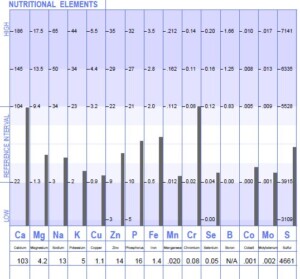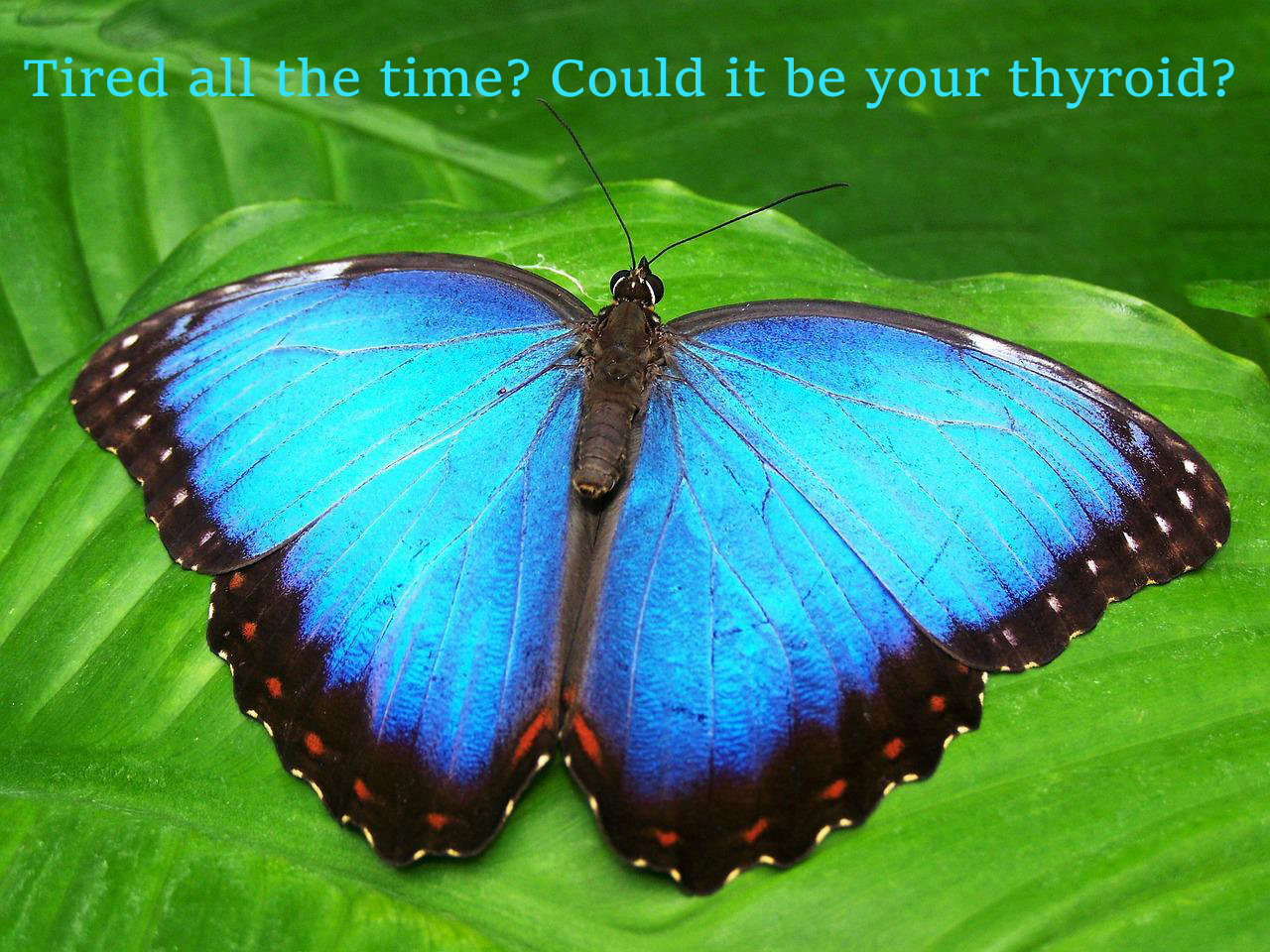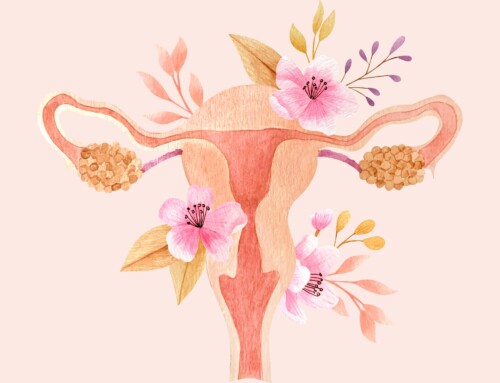Most of us experience periods of fatigue from time to time, especially if we have been overdoing things or going through a period of stress. However, if you are tired all the time, could it be your thyroid? If you feel like you are dragging yourself around, just trying to get through the day, it’s definitely time to take a closer look at what is going on.
There are many possible underlying causes of fatigue, one of which is hypothyroidism (underactive thyroid). Whenever a client describes some of the following signs and symptoms, I always recommend thyroid testing.
- Fatigue – mental and physical
- Tiredness even after a good sleep
- Difficulty thinking and concentrating
- Brain fog
- Depression
- Lack of motivation
- Weight gain and difficulty losing weight
- Fluid retention
- Feeling chilly and increased sensitivity to the cold
- Hair loss
- Constipation
- High cholesterol
- Dry skin
- Menstrual irregularities
- Repeated miscarriages or infertility
- Loss of the outer third of the eyebrows
- Muscle and joint pain
One of my clients described the fatigue as “like walking through treacle”. It is the type of tiredness that makes thinking really difficult and everything becomes an effort. This can lead to lack of motivation and sometimes feelings of depression. There can also be the feeling of not quite being here due to brain fog. Clients may feel that they just have to go and lie down, even if they are usually a person who is on the go all the time.
If this resonates and you would like to consult with me on a one to one basis, we will take a journey together to explore how you arrived at this point. We will discuss your physical and emotional symptoms, stresses, diet and lifestyle. I will recommend the best tests for you and formulate personalised recommendations . This may include for nutritional and lifestyle changes, stress management, nutritional supplements, homeopathic remedies, tissues salts, flower remedies and herbs.
What does the thyroid do?
The thyroid is a butterfly shaped gland which is located in the neck, just below the larynx. Simply put, the thyroid synthesises hormones which determine our metabolic rate i.e the rate at which our body’s cells work. Because the thyroid influences all body cells, a deficiency of thyroid hormones can effect virtually every body processes, resulting in multiple symptoms ¹. The slowing down of bodily functions can lead to lack of energy, weight gain, constipation, lowered body temperature, difficulty thinking and the other symptoms listed above.
As I practice holistic medicine, I consider energetic as well as physiological imbalances. In energy medicine, the thyroid is controlled by the throat chakra and the colour of this chakra is blue. This is why I chose a blue butterfly for the image. When the throat chakra is blocked, we may have problems with our thyroid gland as well as difficulty speaking out and expressing ourselves. The throat chakra is also associated with following our dreams (Caroline Myss, Anatomy of the Spirit).
Is thyroid hormone replacement the only answer?
Firstly, it is important to point out that hypothyroidism should not be left untreated, as this can be dangerous. If your thyroid is classified as being clinically underactive, you will usually be put on thyroid hormone replacement such as Levothyroxine. For some people, Levothyroxine is definitely the answer as their symptoms disappear and they really feel well again. However, thyroid hormone replacement doesn’t address the reasons why your thyroid became underactive in the first place. If this applies to you and you aren’t satisfied with this situation, we can work holistically to improve your health whilst you remain on Levothyroxine (with regular monitoring of blood thyroid hormone levels).
Sometimes people still experience symptoms of hypothyroidism even when taking Levothyroxine². One reason for this is that some people can not effectively convert Levothyroxine T4 to the more biologically active T3. This can be caused by genetic polymorphisms (variations) so sometimes T3 will be prescribed in addition to Levothyroxine. In other people, poor conversion of T4 to T3 could be due to stress or nutritional imbalances. For instance, the conversion of T4 to T3 is dependent on adequate levels of zinc and selenium. These are things that we can influence with nutrition, supplements etc.
What if I don’t want to take thyroid hormones?
Some clients have consulted me because they have been diagnosed with hypothyroidism but they are reluctant to take thyroid hormones for the rest of their lives, without trying to rebalance their thyroid naturally first. As mentioned above, hypothyroidism should never be left untreated, however, I have usually found that Doctors are supportive of this situation. Often they will agree to a trial period of up to three months to balance the thyroid naturally (although of course this depends upon the severity of the symptoms and the blood test results).
What if my tests are normal but I still have symptoms of hypothyroidism?
In my experience this happens so often! One reason for this is that the reference range for TSH is very wide (in the UK the reference range for TSH is 0.27 – 4.2 mU/L). However, some sources³ have recommended that the upper reference range should be lowered to 2.5-3mU/L.
When your TSH is higher than 4.2mU/L but you have symptoms of hypothyroidism, this is classified as sub clinical hypothyroidism. Under these circumstances, you would generally not be offered medication. I view this as a positive situation because it provides a window of opportunity to rebalance your thyroid naturally.
I will discuss blood testing in more detail in future blogs.
Nutrition and the thyroid

Hair Tissue Mineral Analysis (HTMA)
Nutrition is crucial for thyroid function as thyroid hormone synthesis is dependent upon vitamins and minerals from the food that we eat. For example, iodine, selenium and zinc are essential for making T4 and for converting it into T3 (the most biologically active thyroid hormone). Adequate protein is also important to provide the amino acid tyrosine. Iron and potassium as well as vitamins, A, E, and the B group of vitamins are all needed for the thyroid to function properly.
I find Hair Tissue Mineral Analysis (HTMA) a particularly enlightening test for my clients with thyroid symptoms. It provides information about tissue minerals levels over the last 3-4 months, as well as the ratios between certain minerals. People with sub optimal thyroid function often tend to have particular patterns of minerals. For example, so many of my thyroid clients have low levels of selenium, too much calcium in relationship to potassium, and altered adrenal ratios. All of these have an impact upon thyroid function.
You can read more about HTMA testing here.
What is the natural approach?
The natural approach is always to endeavour to identify and address the root cause(s) of thyroid imbalance. The underlying causes differ for each person and may include vitamin and mineral imbalances, toxicity (e.g heavy metals), adrenal fatigue, stress, female hormone imbalance, impaired gastrointestinal function, and autoimmunity. Once the causes have been identified, natural therapies can be used to help rebalance you. Holistic medicine encompasses nutrition, stress management, homeopathy, tissue salts, flower remedies and herbs. The natural approach can also be used to alongside prescribed medication such a Levothyroxine.
References:
¹ Pizzorno, J. E., & Murray, M. T., Third Edition (2006). Textbook of Natural Medicine p. 1791.
² Rush University Medical Center. “Hypothyroidism symptoms linger despite medication use, normal blood tests.” ScienceDaily. ScienceDaily, 12 October 2016.www.sciencedaily.com/releases/2016/10/161012132038.htm
³ Isabella Wentz, Hashimoto’s Thyroiditis, Lifestyle Interventions for Finding and Treating the Root Cause, 2013, p.30
Caroline Myss, Anatomy Of The Spirit, The Seven Stages of Power and Healing, Bantam Books, 1997,




